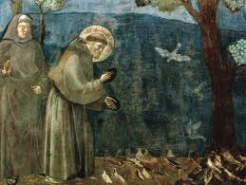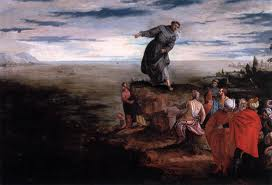Every Sunday, Catholics recite the Nicene Creed (the wording of which will change slightly on November 27, 2011), and we say things that surely cause secularist eyes to go white, rolling up into thick skulls. For instance: “He came down from heaven: by the power of the Holy Spirit, He was born of the Virgin Mary, and became man.”
Thus described, the Incarnation stands as a central – if not THE central – premise of the faith. And so much follows from this miraculous event: mainly, more miracles.
Most Saturday mornings in winter, my wife and I go to a farmers market at an Episcopal church a few miles north of where we live. Hydroponic and greenhouse veggies and fresh fish caught in the frigid waters of the Atlantic. In a grassy (often snow-covered) area just off the church parking lot is a small statue of St. Francis of Assisi.
Episcopalians do have saints, although this church isn’t a “Saint Francis,” which happens to be the twentieth most popular name for Episcopalian churches in the United States. (Christ Church is number one.) The statue shows Francis preaching to birds. By tradition, his confrere, St. Anthony of Padua, sermonized fishes in a river in Rimini, and our secular brethren would surely ask:
“Do you actually believe medieval Franciscans could preach to starlings and mackerels?”
And the answer – and it ought to be given with a great, glad grin – is “Yes!”

A rationalist might ask: “You’re saying the birds understood Italian and the fishes Portuguese?” (St. Anthony was born in Lisbon.)
And I reply: “Look, have you ever spoken sweet, soothing words to a cat? And did the cat rub against you purring?”
When those early Franciscan saints proclaimed Jesus Christ to various fauna, the animals felt – and understood – the love of their Creator. The homilies of Francis and Anthony vibrated in brute bones and brains, and though the beasts hadn’t a human’s self-awareness (blessed are the beasts!), they could sense in the words of the ragged, shoeless men the very Truth that had made them.
Did Moses part the sea? Did the fig tree wither? Did Lazarus rise? Can I be saved? “For human beings this is impossible, but for God all things are possible.”
If you don’t believe that, you don’t believe, period.
I have a good touch with the roses and lavender in my garden. Is it my faith that makes the plants bloom? No. To the extent that I do anything at all, it’s via reason: fertilizing and watering and pruning at the appropriate times. If I wished to plant an orange tree in the front yard of my New York home, would it grow? No. But only, perhaps, because my faith is weak. Because if it were strong, I should be able to make an orchard of oranges and bananas and mangoes and papayas grow right here in Zone Six, although with such faith we might well wonder why I’d be fussing over fruit.
My time would be better spent healing the sick.
“You mean you believe that by laying on of hands or whatever a saint could give sight to the blind? Make a lame man walk? Cast out some poor soul’s pancreatic cancer?”

Yes. Jesus and His Apostles and His saints have often reached right into the genetic code and rewritten it. Crick and Watson may have been the first to “discover” the structure of DNA, but God made those nucleic acids, and they obey His will, as do those Apostles and saints, which is why they’re able to do what the rest of us can’t do.
That farmers-market church is called St. Thomas, after the Apostle who doubted, then saw and believed, and to whom our Lord said: “Blessed are those who have not seen and have believed.” To have faith today in the midst of what science – medicine especially – daily presents to us as rational miracles is harder for us than it ever was for Thomas. That I might reach out my hand to cure somebody sick with something . . . that I might feel an energy I cannot comprehend flow through my soul, out my fingers, and into the disease, there to delete it as easily as I backspace errors when I write. That I might feel such love . .
When the centurion came to Jesus and asked the Lord to heal his suffering servant (and Jesus agreed to come to the Roman’s house), the soldier spoke words we know from Mass (words also changing in November): “Lord, I am not worthy to have you enter under my roof; only say the word and my servant will be healed.” And then the centurion said:
For I too am a person subject to authority, with soldiers subject to me. And I say to one, “Go,” and he goes; and to another, “Come here,” and he comes; and to my slave, “Do this,” and he does it.
Matthew writes that Jesus was amazed. Imagine amazing God! Maybe Matthew took Christ’s next words as objectively astonishing: “Amen, I say to you, in no one in Israel have I found such faith.”
How did a Roman company commander see what – at that point – even Christ’s closest followers did not? How was a pagan able to acknowledge God’s power over everything? Here was a no-nonsense soldier who wouldn’t have been shocked to see birds swim and fish fly! Or sinners made whole for the glory of God.
















